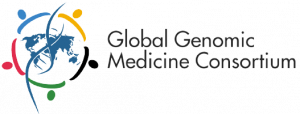G2MC 6th International Conference: Session Summaries and Takeaways
The G2MC 6th International Conference successfully concluded on October 1, 2021. The three-day virtual conference brought together 205 attendees from 45 countries who tuned in to listen to and engage with our panel of 56 speakers, which included genomic medicine leaders and experts spanning 23 countries. Continue reading for brief summaries and key takeaways from each session. You may also watch session recordings and view other conference materials on the event webpage.
Session I: Young Investigator Forum
The Young Investigator Forum (YIF) provided a platform for young researchers from around the globe to showcase their original research studies and proposals to global leaders in genomic medicine. The Forum included two sessions. During session one, seven young investigators presented diverse research findings and experiences in implementing genomic medicine in their respective settings. During session two, three young investigators presented research proposals to a panel for possible seed funding. The forum concluded with a panel discussion designed to allow young investigators to ask questions and seek guidance from genomic medicine investigators at different stages of their careers and in different areas of genomic medicine.
Key Takeaways/Next Steps
- Research article on YI’s experiences/challenges
A research article on YI’s experiences/challenges in the implementation of genomic medicine in their respective settings will be prepared for publication. Interested YIs will be invited to contribute to this paper. - Webinar on preparing research presentations
A webinar will be arranged to provide training for YIs to improve the quality of their research presentations (poster/oral) at international conferences. Senior members of G2MC who are interested could serve as resource persons to share their expertise with the YIs. - YI mentorship pairing
Pairing of YIs needing mentorship (working or planning to work on specific genomic medicine related research projects) with senior members of G2MC who would serve as mentors.
Session II: Harnessing Policy to Drive Inclusive Innovation in Genomic Medicine
In this session, four experts gave presentations on their efforts to integrate existing polices into the practice of genomic medicine, and the impact these policies have made on public health responses, research collaborations, and equity in medicine.
Key Takeaways/Next Steps
- Key pillars for NHS genomic initiatives: Political leaders support, proof of concept studies, infrastructure funding, clinical pull, patient at the center
- Policies for implementation vary around the world but many focus on the evaluation and technology assessment
- Inclusion and access to new technologies are key to advance implementation
- Important to make choices, replace all practices with new technologies
- Short term wins and outcomes are key to ensuring long term investments in genomics
G2MC will be a resource to identify policies around clinical genomics and precision medicine
Session III: Evaluating the Evidence for Genomic Medicine Implementation into Clinical Practice
This session aimed to portray the necessity of providing evidence to support the clinical utility and advantages of genomic medicine. Specifically, these experts presented their practices for generating evidence and how they use evidence to create standardized guidelines and make informed health decisions.
Key Takeaways/Next Steps
- RCTs will be needed for specific questions in a defined setting
- Other types of evidence should be explored – systematic reviews, registries
- Artificial Intelligence (AI) tools can be helpful for funneling information into systematic evidence reviews
- Physicians need evidence-based guidelines; Payers need evidence-based policies
G2MC will be a resource for systematic reviews of evidence for genomic medicine
Session IV: Lessons Learned from Genomic Medicine Implementation Projects
This session aimed to introduce participants to the science of implementation, genomic medicine implementation projects being conducted at several sites globally, the tools that enable such implementation including family history assessment, and how basic science research can inform genomic medicine implementation projects. This was facilitated by the four talks followed by a question and answer session.
Key Takeaways/Next Steps
- Implementation is a science and frameworks can enable global implementation; setting dependent
- UAE challenges – similar to others – knowledge, data access, informatics, biobanks, economics
- Electronic image atlases are enabling the diagnosis of rare genetic syndromes
- Family history is a great exemplar of implementation in diverse settings
- Breast cancer risk testing is expanding into PRS, family history, behavior, and environment
G2MC will be a resource for implementation frameworks
Session V: Preparing the Workforce for Genomic Medicine
Education of the healthcare workforce will be critical to the implementation of genomic medicine worldwide. This session explored general principles of health provider education in genomic medicine and examples of programs that have been implemented in high and low/middle income countries. The presentations were followed by a panel discussion that will allow time to discuss strategies for the successful deployment of genomic medicine education in various settings.
Key Takeaways/Next Steps
- Australia (Melbourne Genomics), US (Hudson Alpha), and Chile’s experience in genetic education discussed
- Evaluate the real needs, use evidence-based and theory-informed surveys
- Empower non-genetics healthcare professionals
- Education, not intuition, but evidence-based
- Education tools should be tested and disseminated for others to lean
- Think outside the box and alternative ways of doing things
- Need to expand genetic counseling programs in Latin America
G2MC is assessing educational needs and hopes to map and develop educational tools and make them available to the global community
Session VI: Innovation in Global Implementation of Genomic Medicine
The G2MC is committed to implementing genomic medicine in limited resource settings. This session aimed to highlight the innovative aspects of these implementations – what has been successful and what has failed and why?
Key Takeaways/Next Steps
- Contributions from Africa, Asia, Latina America and North America –foster international collaboration!
- Think Big, Start Small, and Be Flexible
- Building trust and opening communications to demonstrate the value of genomics with participants (co-creation and participatory models)
- Start developing pilot projects and proof of concept
- Incorporate education on every level – participants; researchers, and providers
- Work hand in hand with regulators and policymakers
- Find new ways of working and collaborating with Industry partners
- Share lessons learned, challenges, and opportunities
G2MC will be capturing success stories of clinical implementation across the globe





